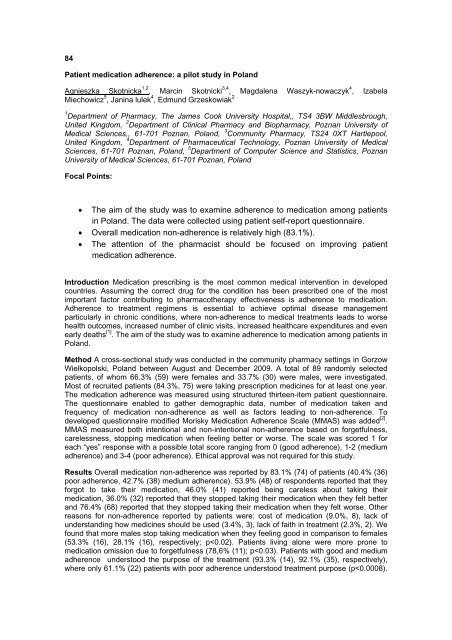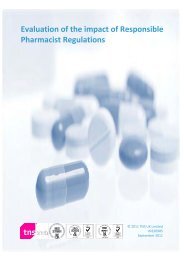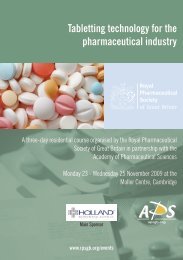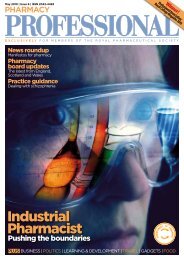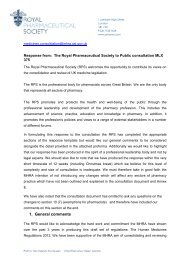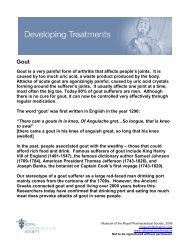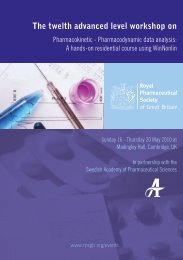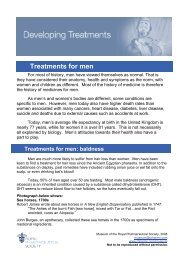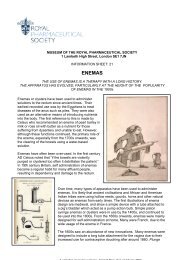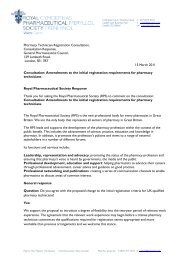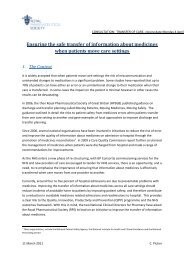RPS Conference 2010, Abstracts 2010 - Royal Pharmaceutical Society
RPS Conference 2010, Abstracts 2010 - Royal Pharmaceutical Society
RPS Conference 2010, Abstracts 2010 - Royal Pharmaceutical Society
You also want an ePaper? Increase the reach of your titles
YUMPU automatically turns print PDFs into web optimized ePapers that Google loves.
84<br />
Patient medication adherence: a pilot study in Poland<br />
Agnieszka Skotnicka 1,2 , Marcin Skotnicki 3,4 , Magdalena Waszyk-nowaczyk 4 , Izabela<br />
Miechowicz 5 , Janina lulek 4 , Edmund Grzeskowiak 2<br />
1 Department of Pharmacy, The James Cook University Hospital,, TS4 3BW Middlesbrough,<br />
United Kingdom, 2 Department of Clinical Pharmacy and Biopharmacy, Poznan University of<br />
Medical Sciences,, 61-701 Poznan, Poland, 3 Community Pharmacy, TS24 0XT Hartlepool,<br />
United Kingdom, 4 Department of <strong>Pharmaceutical</strong> Technology, Poznan University of Medical<br />
Sciences, 61-701 Poznan, Poland, 5 Department of Computer Science and Statistics, Poznan<br />
University of Medical Sciences, 61-701 Poznan, Poland<br />
Focal Points:<br />
• The aim of the study was to examine adherence to medication among patients<br />
in Poland. The data were collected using patient self-report questionnaire.<br />
• Overall medication non-adherence is relatively high (83.1%).<br />
• The attention of the pharmacist should be focused on improving patient<br />
medication adherence.<br />
Introduction Medication prescribing is the most common medical intervention in developed<br />
countries. Assuming the correct drug for the condition has been prescribed one of the most<br />
important factor contributing to pharmacotherapy effectiveness is adherence to medication.<br />
Adherence to treatment regimens is essential to achieve optimal disease management<br />
particularly in chronic conditions, where non-adherence to medical treatments leads to worse<br />
health outcomes, increased number of clinic visits, increased healthcare expenditures and even<br />
early deaths [1] . The aim of the study was to examine adherence to medication among patients in<br />
Poland.<br />
Method A cross-sectional study was conducted in the community pharmacy settings in Gorzow<br />
Wielkopolski, Poland between August and December 2009. A total of 89 randomly selected<br />
patients, of whom 66.3% (59) were females and 33.7% (30) were males, were investigated.<br />
Most of recruited patients (84.3%, 75) were taking prescription medicines for at least one year.<br />
The medication adherence was measured using structured thirteen-item patient questionnaire.<br />
The questionnaire enabled to gather demographic data, number of medication taken and<br />
frequency of medication non-adherence as well as factors leading to non-adherence. To<br />
developed questionnaire modified Morisky Medication Adherence Scale (MMAS) was added [2] .<br />
MMAS measured both intentional and non-intentional non-adherence based on forgetfulness,<br />
carelessness, stopping medication when feeling better or worse. The scale was scored 1 for<br />
each “yes” response with a possible total score ranging from 0 (good adherence), 1-2 (medium<br />
adherence) and 3-4 (poor adherence). Ethical approval was not required for this study.<br />
Results Overall medication non-adherence was reported by 83.1% (74) of patients (40.4% (36)<br />
poor adherence, 42.7% (38) medium adherence). 53.9% (48) of respondents reported that they<br />
forgot to take their medication, 46.0% (41) reported being careless about taking their<br />
medication, 36.0% (32) reported that they stopped taking their medication when they felt better<br />
and 76.4% (68) reported that they stopped taking their medication when they felt worse. Other<br />
reasons for non-adherence reported by patients were: cost of medication (9.0%, 8), lack of<br />
understanding how medicines should be used (3.4%, 3), lack of faith in treatment (2.3%, 2). We<br />
found that more males stop taking medication when they feeling good in comparison to females<br />
(53.3% (16), 28.1% (16), respectively; p


